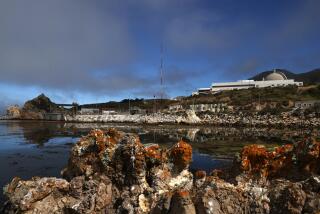Rush for Power Plant in Chino Raises Concerns
- Share via
CHINO — Seldom are government bureaucrats criticized for moving too quickly, but so goes the battle here over a power plant slated for the sun-blasted grounds of a men’s prison.
The proposed plant--big enough to supply 135,000 homes--is one of five in California that have been licensed to start up despite exceeding pollution standards as part of Gov. Gray Davis’ rush to bring more power online.
The program, covering small to mid-size facilities that run during hours of peak demand, slashes licensing review from a year to three weeks, eliminates comprehensive environmental analyses, and authorizes plants to emit pollutants for months at levels exceeding state and federal air quality laws.
The catch is that the plants must operate by Sept. 30 or those rare and lucrative incentives could be withdrawn--a possibility confronting developers of the Chino plant, which a growing number of environmentalists opposes.
So far, with only 69 days left until the deadline, workers haven’t poured a drop of concrete foundation for the $125-million natural gas-burning facility, developed by Delta Power Co. of New Jersey. The site is on the outskirts of the California Institution for Men.
The proposed plant, the largest of 11 so-called peakers given expedited approval, is galvanizing opposition to the governor’s emergency fast-track program. Environmentalists decry the fact that until the plant installs devices to reduce nitrogen oxide compounds, which contribute to smog, the level of the pollutant will reach five times the legal limit.
Five groups, including the Natural Resources Defense Council and the Planning and Conservation League, have joined in petitioning state air quality officials to deny the plant a final operating permit. They contend that excess nitrogen oxides will endanger public health and that the fast-track process jeopardizes decades of gains against smog.
“We’re not necessarily opposed to a power plant on the site,” said Gail Ruderman Feuer, an attorney in the Los Angeles office of the Natural Resources Defense Council. “We’re just opposed to one without environmental review and without all the pollution controls.”
Critics also are wary of the fast-track process because the state has a vested interest in making sure the plants are built quickly. The Davis administration has promised to spend billions buying electricity from plants that aren’t built yet.
“It’s a massive subterfuge,” said Sandra Spelliscy, an attorney with the Planning and Conservation League in Sacramento.
Jay Roland, manager of the Chino facility for Pegasus Power Partners, a subsidiary of Delta, said the extra nitrogen oxides released from the plant for a month or so are “not going to cause damage to anybody.”
Roland said he is so frustrated by the “interveners,” he sometimes wishes the whole state would go dark, to underscore the power shortage that the plant is intended to address.
Though opponents have made a tough job even tougher, he said he hoped to make the end-of-summer deadline. Missing it could mean applying to the state all over again under the old rules, he said. “Then I sit here nine months with $120 million in equipment that’s not generating any revenue.”
State officials said it was necessary to approve the extra-polluting plants because of the need to avoid blackouts and because there is a backlog of emissions-control equipment. Besides, they said, state-of-the-art gas-burning plants emit fewer pollutants without controls than do many older plants with them.
Kevin Kennedy, a California Energy Commission official who reviewed the Chino project, acknowledged that public involvement in the process has suffered somewhat. “It’s been difficult to get the word out . . . to make sure people in the communities have enough information to know what’s going on.”
Site Seems Ideal for Power Plant
In many respects, the 11-acre Chino site looks right for a power plant. It rests on flat surplus land at the northern boundary of the state’s largest prison property, where grasslands cover hundreds of acres.
Half a mile away is a booming warehouse district and a Southern California Edison substation, which would relay the new power to the transmission grid.
Moreover, Pegasus runs a small power plant on the prison property across a narrow utility road from the site. Supplying steam and a few megawatts to the penal institution, the company sells the bulk of its 27 megawatt output to Edison.
Delta’s president, Dean Vanech, bristles at charges that his company doesn’t care about the environment.
He said equipment to reduce nitrogen oxide compounds won’t be available until around November, at which time engineers will work “as quickly as humanly possible” to install it. Other air pollutants, such as carbon monoxide and microscopic dust particles, will be controlled from the beginning.
Also, though energy officials reviewed the proposal in a matter of weeks, they closely scrutinized the company’s nine-part application, which took two months and $1 million to assemble, plant officials say.
The company moved the plant’s site after biologists discovered two protected bird species nesting nearby--burrowing owls and red-tailed hawks. That required engineers to redesign gas, water and transmission lines and tinker with the plant structure, Roland said.
Owlets in a nest by a proposed transmission tower still pose an obstacle. “We have to wait for the babies to leave,” construction manager Robert Surette said.
Key decisions over the plant’s future lie with the South Coast Air Quality Management District, the air pollution agency, which said in May it would give the Chino plant a construction permit.
But after environmental groups petitioned in late June, the agency asked Pegasus for more data describing the possible impact of elevated levels of nitrogen oxides on people in the plant’s vicinity.
“We’re still in the evaluation phase, and we’re not going to prejudge this project,” said district executive director Barry Wallerstein.
He said the plant emissions were probably negligible compared with those from the parade of diesel trucks in the nearby warehouse district. Those “could be a larger health hazard to the community than this particular power plant,” he said.
Public Hearing to Be Held Today
The air quality agency has scheduled a public hearing today at its Diamond Bar office to weigh issuing the plant a waiver needed to exceed state air quality standards. The U.S. Environmental Protection Agency has indicated it will not prosecute the Pegasus plant for temporarily emitting more nitrogen oxides than the federal Clean Air Act permits.
Vanech of Delta said the company would want to build the plant even if it had not received expedited approval: “The reason we’re doing the project is that we have a favorable long-term view of the California energy market.’
Delta operates 13 power plants nationwide, five of them in California on state-controlled property.
The Chino plant promises to benefit this diverse, mostly blue-collar city of 66,000. Although the developer is leasing the property from the state, Delta agreed to pay the city $500,000 up front, plus $75,000 annually and millions more over the years in water and natural gas fees.
Vanech said the half-million-dollar “host fee” was compensation to City Hall for its swift handling of the project’s mountainous paperwork and for the wear and tear that construction crews will cause on city roads.
In the neighborhood closest to the plant, where large new houses rest on half-acre lots fronted by bridle paths, residents seemed divided.
Jim Tippings, 59, who is retired, said he didn’t have a problem with the plant running a month or so without full nitrogen oxide controls: “I don’t think a month is going to hurt us.” Rising utility bills are what really hurt, he said.
Up the street, 35-year-old Kent Hobbenslefken was not aware that a power plant was going up a mile away. A former hazardous waste manager who sells health insurance, he was skeptical of the need to run the generators without full pollution controls, just to meet a bureaucratic deadline.
“What’s a couple of months delay?” he said. “We’re already in the crisis. What’s it going to do for John Q. Public? Are our rates going to go down? I don’t think so.”
MORE INSIDE
Power glut: An excess forces sale of power at a $14-million loss. B8
Getting soaked: High utility costs threaten swimming programs. D1
More to Read
Sign up for Essential California
The most important California stories and recommendations in your inbox every morning.
You may occasionally receive promotional content from the Los Angeles Times.













